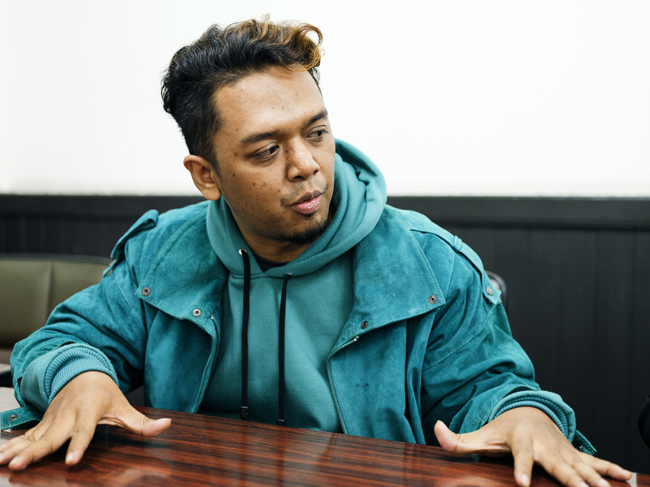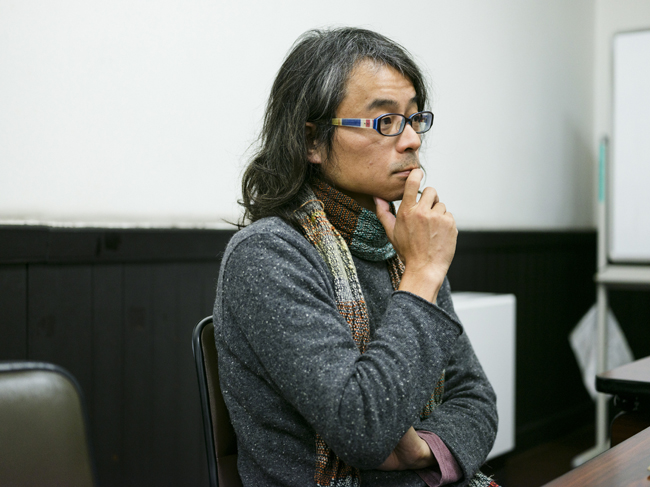
ASIA HUNDREDS is a series of interviews and conference presentations by professionals with whom the Japan Foundation Asia Center works through its many cultural projects.
By sharing the words of key figures in the arts and cultures in both English and Japanese and archiving the "present" moments of Asia, we hope to further generate cultural exchange within and among the regions.
A collective without a hierarchy
Chikara Fujiwara (hereinafter Fujiwara): First, I would like ask you about the Bandung Performing Arts Forum (BPAF). It has the word "Forum" in its name. Initially, I thought it was a kind of assembly, much like a conference. Could it be considered as a so-called theatre company?
Taufik Darwis (hereinafter Taufik): The BPAF is an artist collective*1 . Most of its members have a background in performing arts, but some of them specialise in the visual arts. It is a place for artists from different backgrounds which is not bound by any particular genre. Also, we don't have a hierarchical system like a typical theatre company. Even though it is latently in our subconscious, because we are formed by the history of performing arts with a pattern of top-down relations from the director's authorship as a representation of the community and aesthetics itself. In Indonesia, there is a traditional form of ensemble for performing arts called "Sanggar". The pattern of relations in Sanggar then continued to be used or adopted at the Indonesian Modern Theater, such as Rendra or Putu Wijaya. Unlike Sanggar, the BPAF is an open and equal collective without a hierarchy.
*1 Collective: In recent years, many artist collectives have come into existence in various places. Unlike in a theatre company where things tend to revolve around the director, artist collectives are characterised by the individual autonomy of the participating members and the absence of an old-style hierarchy. There are now even cases where positions such as artistic director or director are taken up not by individuals but by the collectives.

Fujiwara: Is your area of activity limited to Bandung?
Taufik: We have no intention of confining ourselves to Bandung. We named it as it is only because we happened to be in Bandung. What is most important to us is to come together and organise events or engage in creative work, so it is accidental that we have the name of a certain place. We sometimes perform in Yogyakarta too.
Fujiwara: You don't own any specific theatre or space?
Taufik: Because we are always on the move, we do not have a home base as such.
Fujiwara: So the place you gather becomes a forum. I see. You are one of the founding members. Is that correct?
Taufik: Yes, it was established in 2016. Sanggar originally referred to the groups of traditional performing arts such as wayang kulit and gamelan, and modern theatre followed suit by adopting the same style. I was not sure why we still have to follow this format today. The city of Bandung itself has strongly reflects the traditional hierarchical system of Sanggar. And there were other people, not just me, who felt that artists were restricted by such relationships and could not enjoy exchanges among themselves. It was these people who thought about creating a freer space and a different ecosystem*2 from Sanggar; that is how the BPAF started.
*2 Ecosystem: In performing arts in recent years, "sustainability" has often been raised as a theme for discussion. Particularly in regions around Asia where it is difficult to obtain public funding or support from publicly funded theatres, artists and producers are facing the issue of how to sustain the activities of individuals and organisations. It is thought that the word ecosystem here refers to both the economic and ideological foundations for sustaining such activities.
Fujiwara: So it is not run by any organisation or institution, but the artists are taking the initiative and planning by themselves.
Taufik: Yes, when we talk about forming a collective, there is a tendency for artists to take the initiative. Not that we were particularly conscious about that, but we just started the forum because we wanted to set up a place that would allow us to create our work. We tried to create a space that is comfortable for us without necessarily being constrained by the system of Sanggar. This is how the BPAF came into being.
Fujiwara: Before forming the BPAF, were you involved in theatre as a member of a particular Sanggar?
Taufik: No, I have always worked as a freelance and have never belonged to a Sanggar. Initially, I studied performing arts at Indonesia Art College (STSI) Bandung. I learned acting, directing and playwriting, and I experienced almost everything except for scenography. Then, I went on to do my master's degree at Sanata Dharma University in Yogyakarta.
Fujiwara: Did you also study performing arts for your master's degree?
Taufik: No, it was religion and culture. The course wasn't about studying the teachings of religion, but it considered religion as culture. It dealt with not only Islam but with all religions.

Fujiwara: It is interesting to hear that you went on to study religion and culture, and not the performing arts. The relationship between people and religion can be very different depending on the country and region. In Indonesia, religion seems to have a huge influence on people's lives. As well as drinking and eating, everyday life practices, including what time you wake up and what time you hear the adhan (Islamic call for worship), seem to be connected closely to religion. How did you approach the theme of such relationships between religion and everyday life or culture?
Taufik: The reason I went to a university for my master's degree and not to an art college is because I was more interested in culture that appears in everyday life rather than culture as a form of art. I didn't just focus on religion but wanted to study "culture in everyday life". It is a type of cultural studies. My research was actually about the Baduy people who live up-country in West Java and how their music and dance were connected to their lives.
- Next Page
- A project with people who faced eviction






